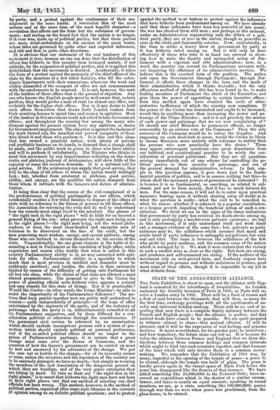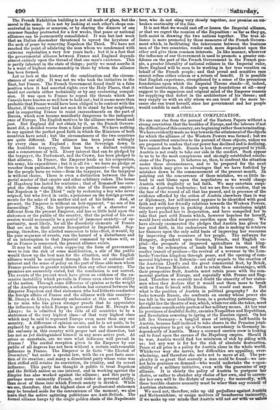STATE OF THE ANGLO-FRENCH ALLIANCE.
THE Paris Exhibition is about to open, and the alliance with Eng- land is cemented by the interchange of hospitalities. As London sustained the friendly invasion of Paris in 1851, so Paris will re- ceive a London army in 1855. There will be a feast of reason and a flow of soul between the thousands that will then, so many for the first time, exchange greetings with all the excitements of no- velty and universal holiday-making. There will be no end of re- peating that now there is a complete family intimacy between the French and English people ; that the alliance is perfect, and that ancient feuds have ceased to be possible. We are quite prepared to witness—almost to share—that mutual effusion. It will be pleasant, and it will be the expression of real feelings and genuine motives. It must nevertheless, for the greater part, be transitory ; and how transitory, the future alone can tell us. It is because we value the alliance between France and England that we draw dis- tinctions between those common feelings and common interests which ought to bind two such countries together, and that humour of the hour which will only involve them in a common merry- making. We remember that the Exhibition of 1851 was, by many, regarded as the opening of the temple of peace—a peace t3 be eternal, although the temple was built of glass. The grass is hardly grown again in the vacant space of Hyde Park before the peace has disappeared like the flowers of that summer. We have added something like 25,000,0001. to the National Debt; have in- curred an expenditure which is the shadow of a similar encum- brance, and taxes to nearly an equal amount; speaking in round numbers, we are, tip a state, something like 100,000,0001. poorer through war than we were when peace was proclaimed, from the glass-house, to be eternal.
The French Exhibition building is not all made of glass, but the moral is the same. It is not by looking at each other's shops con- centrated in temple or museum, or by sharing the dinners of one summer Sunday protracted for a few weeks, that peace or national alliances can be permanently consolidated. It was but last week that an Italian shoemaker threatened to uproot the keystone of the arch of peace by removing Napoleon the Third. We have not reached the point of adulating the man whom we condemned with extreme reprobation a very few years back ; but it is a fact that the governmental alliance between France and England depends almost entirely upon the thread of that one man's existence. This is partly inherent in the state of things ; partly we must ascribe it to a want of highest statesmanship in those by whom the alliance has been formed.
Let us look at the history of the combination and the circum- stances of our ally. It was not we who took the initiative in the East, but France. The French Government found itself in a false position when it had asserted rights over the Holy Places, that it could not sustain either technically or by any overawing compul- sion. It was open to France to repeat the threats which her Consuls have known so well how to hold out ; but it seems more than probable that France would have been obliged to be content with the bluster, if this country had not seen fit to stand by her neighbour, and in supporting France to resist encroachments on the part of Russia, which now became manifestly dangerous to the independ- ence of Europe. The English motives to the alliance were broad and just. But England did not obtain by it, as the French Govern- ment did, a decided rescue from a false position. We have nothing to say against the perfect good faith in which the Ministers of both countries have acted ; but the circumstances of the two countries are quite different. The alliance has been joined willingly by every class in England ; from the Sovereign down to the humblest taxpayer, there has been a distinct volition and a concurrence of will. Every interest that can be pledged by the taxpayer, the Parliament, and the Crown, has been pledged to that alliance. In France, the Emperor lends us his cooperation, his army, his expenditure ; but it is all his : we have no pledge or voucher from parliament, for there is no parliament—from people, for the people have no voice—from the taxpayer, for the taxpayer is without choice. There is even a distinction between the Im- perial master of that empire and other arbitrary rulers. The house of Hapsburg has lasted for centuries ; that of Romanoff has occu- pied the throne during the whole rise of the Russian empire ; but Napoleon is " the Third " only by reckoning a boy who never reigned, but who lived in exile, a pensioner on the foreign govern- ments for the sake of his mother and not of his father. A-nd, at present, the Emperor is without an heir-apparent, " no son of his succeeding." Nay, the heir-presumptive is of a character so different from the present Emperor, and has so little hold upon the statesmen or the public of the country, that the period of his suc- cession would necessarily be a period of immense anxiety—of op- portunity, most likely, for all the disorderly elements of France that are not in their nature Bonapartist or Imperialist. Sup- posing, therefore, the allotted succession to take effect, it would, by the pure sequence of events, run the hazard of a disturbance and of an interruption to that Imperial command' by whose will, so far as France is concerned, the present alliance exists.
It may be said that, even supposing the form of government were to run the risk of some modification, a stir of the public -would throw up the best man for the situation, and the English' alliance would be continued through the force of national self- interest and the sense of policy on the part of those able men whom Prance produces in greater numbers than any other country. The
'sea are accurately stated, but the conclusion is not correct The events of the present week have given an evidence of the ex- cessive instability which prevails in France even above the ability of the nation. Through some difference of opinion as to the weight of the Austrian representations, a schism has occurred between the Emperor Napoleon and that statesman who hadhitherto conducted the foreign affairs of France and the alliance with this country— M. de Lhuys, formerly ambassador at this court. There is no man who has given stronger proofs that he appreciates the influences by which Europe is governed than M. Drouyn de Lhuys; he is admitted by the elite of all countries to be a statesman of the very highest class—of that very highest class which may be said to represent Europe even more than any one country. A difference of opinion occurs, and he is set aside, to be replaced by a gentleman who has carried on the set business of the embassy in this country with proper tact and discretion, but has not as yet distinguished himself in any more active post. At crises so uncertain, are we 'sure what influence will prevail in France ? The cordial reception given to the Emperor by our public of all degrees has not been without a certain unfavourable influence in France. The Emperor is de facto "the Elected of December," but under a special law, with the ex post faoto sane- tion, of its creation ; and many a dissentient party whose voice was then stifled still retains its conviction, its vitality, and its covert influence. This party has thought it politic to treat Napoleon and the British nation as one interest, and in working against the Empire has also worked against the alliance ; and this party is perhaps more eminently French, and richer in personal ability, than most of those into which French society is divided. While we see, therefore, that the highest class of professional statesmen may be brushed aside for the convenience of the moment, we also learn that the active agitating politicians are Anti-British. The formal alliance hangs by the single golden ohain of the Napoleonic bees, who do not cling very closely together, nor promise an un- broken continuity of the line. It is not that we would oast offair loosen the Itaperial alliance, or that we regret the reunion of the Exposition: so far as they go, both assist in drawing the two nations together. The true al- liance is more promoted by those measures of the French Govern- ment which, in facilitating the intercourse between the business men of the two countries, render each more dependent upon the other and give them common interests. In like manner, wherever the influence of our Government is used to promote a greater con- fidence on the part of the French Government in the French peo- ple, a greater liberality of national reliance in the Imperial ruler, there England will be seen to be working in her true vocation on behalf of the French people; and that proud and sensitive race cannot refuse either esteem or a return of benefit. It is possible that English experience, strengthened by a sense of the precarious foundations upon which the Imperial Throne stands—if, indeed, without institutions, it stands upon any foundations at all—may suggest to the sagacious and original mind of the Emperor reasons for supplying that defect in the architecture of his throne ; and may supply us with an ally whom we can trust all the more be- cause she can trust herself, since her government and her people would confide in each other.



























 Previous page
Previous page